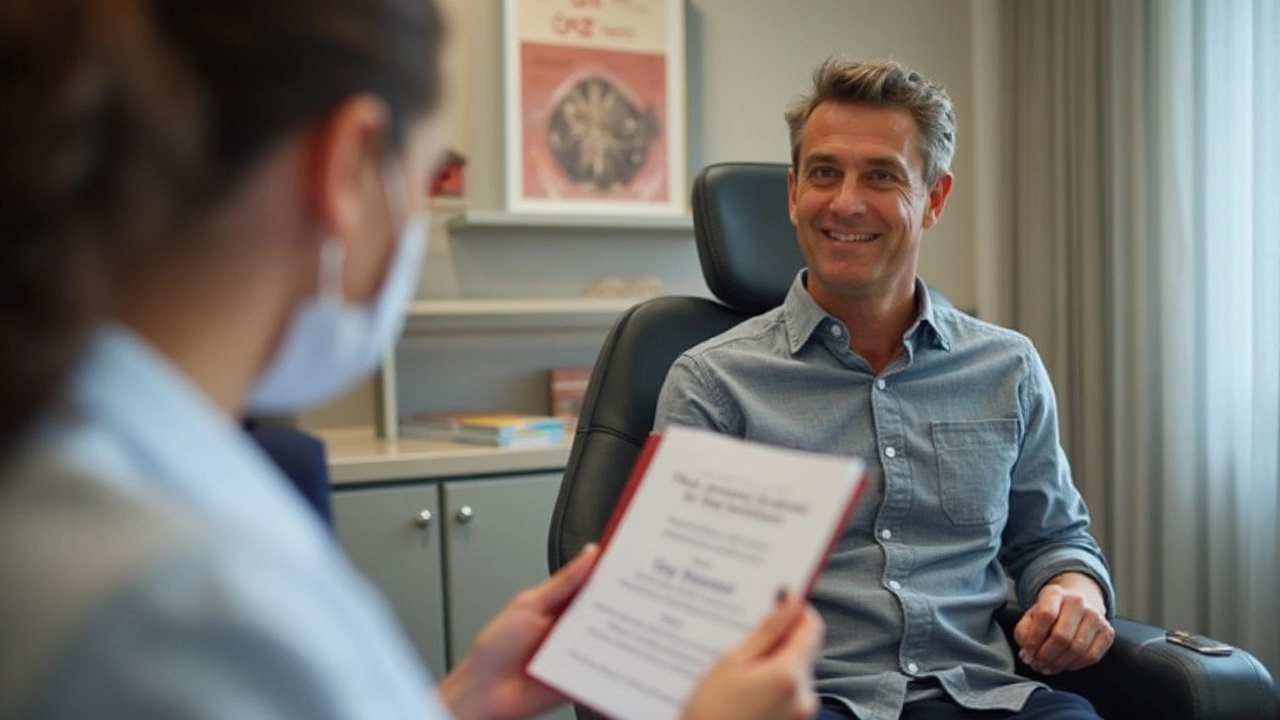Dental care in the UK is a subject both crucial and intriguing for many. The quest for affordable or free fixes, like dental implants, often leaves individuals searching for viable options. While the National Health Service (NHS) provides a range of dental treatments, understanding what you might be eligible for isn't always straightforward.
There are generous organizations out there working to bridge the gap between need and accessibility, offering assistance where the NHS might not cover. Knowing where to turn and what to expect could make a significant difference in your oral health journey.
In this article, let's walk through the various pathways and resources available to those seeking dental solutions without the heavy price tag. Through a combination of available NHS treatments, charitable aid, and tips for finding low-cost services, you will be better equipped to manage your dental health needs.
- Understanding Free Dental Care in the UK
- The Role of the NHS in Dental Treatments
- Charitable Organizations Offering Dental Help
- Low-Cost Dental Implant Options
- Tips for Accessing Affordable Dental Care
- The Importance of Oral Health and Well-being
Understanding Free Dental Care in the UK
Exploring the realm of free dental care in the United Kingdom opens a door to a system that many may not fully comprehend. The National Health Service (NHS) is a central pillar, offering various dental services that are heavily subsidized. However, it's important to know that not all treatments are completely free for everyone. For specific groups, such as children under 18, pregnant women, and those receiving certain types of government support, the NHS does provide free dental services, which include essential treatments like check-ups, fillings, and extractions. The landscape of free dental care is complex, offering avenues that are worth understanding for anyone needing assistance.
Delving deeper into the eligibility requirements, the NHS makes concerted efforts to ensure accessibility, yet the regulations are structured with certain constraints. Adults not covered by exemptions often face costs on a sliding scale, based on the complexity of the treatment. For those needing more advanced care, such as dental implants, the NHS typically categorizes these under treatments that are not routinely available without good cause. It's vital to have thorough conversations with your dentist who can guide you through the process, assess your needs, and determine if your situation qualifies for specialized cases where the NHS might cover these services.
In rare circumstances, community services and dental schools might offer free or reduced-price consultations and treatments. These opportunities allow dental students, under the guidance of qualified professionals, to gain practical experience while serving the community. Such initiatives help to alleviate some pressure off the formal healthcare system and can be a wonderful alternative for those looking for affordable dentistry. As dental care holds an essential place in personal well-being, making proactive choices about where and how to seek these resources is key.
While it's not widely recognized, there are charitable organizations that walk alongside the NHS to provide free care to those slipping through the cracks. These organizations often seek to help the homeless, those battling severe financial hardship, and other vulnerable groups. By tapping into these resources, individuals can secure assistance that may otherwise remain inaccessible. Discovering these pathways can indeed be life-changing and transformative.
The UK's focus on oral hygiene, underscored by studies revealing the impact of a healthy mouth on overall health, underscores the importance of interventions and programs that support dental health equity. As awareness grows and more people understand the intersection between dental health and general health, it's encouraging to know there are systems designed to aid everyone in making healthy choices.
"Access to adequate dental care is a fundamental aspect of public health, ensuring the well-being of all citizens," says a spokesperson from the British Dental Association.
The Role of the NHS in Dental Treatments
The National Health Service (NHS) plays a significant role in providing dental care across the UK. Since its inception, the NHS has worked to ensure that essential health services, including dental, are accessible to the majority of the population. This commitment to health equity means that many dental treatments are partly or fully subsidized. Yet, the realm of dental implants within the NHS is more nuanced, often dependent on specific health requirements rather than cosmetic desires. Understanding these distinctions helps individuals navigate their options more effectively.
NHS dental care is categorized into bands, which outline the type and cost of treatments available. Basic treatments like examinations, diagnosis, and advice fall under Band 1, while Band 3 covers more complex interventions such as crowns, dentures, and bridges. However, free dental care is mostly reserved for those needing essential treatments to maintain oral health, particularly when medical depth adds complexity. Dental implants are not universally covered and are typically reserved for cases where standard treatments won’t suffice, for example, after significant injury or serious health conditions.
Overall, NHS funding for dental implants tends to prioritize clinical over cosmetic needs. Consequently, those requiring implants due to trauma, genetic conditions, or oral cancers are more likely to receive coverage. But this doesn't mean individuals cannot explore other avenues within the NHS framework. Charitable initiatives often step in to fill these gaps, ensuring access remains equitable. Patients are advised to discuss thoroughly with their dentists, who can provide guidance on eligibility and alternate routes if necessary.
One substantial benefit of the NHS is the consistency it offers in maintaining oral health over time. Regular check-ups under Band 1 services can prevent diseases that might eventually lead to invasive treatments. This preventive approach underscores the importance of consistent dental care and education on oral hygiene. The NHS collaborates closely with various partners to extend comprehensive care beyond just treatment, emphasizing awareness and prevention. As reported by NHS England, "an ounce of prevention is worth a pound of cure," a reminder of the profound impact early dental intervention can have.
The role of the NHS extends beyond mere treatment. It encompasses a holistic view of dental care, focusing on community outreach and education. Numerous campaigns are run annually to encourage better hygiene practices and reduce the prevalence of decay and gum disease. These initiatives often involve free workshops, school programs, and smoking cessation support – all aimed at presenting dental care as a pivotal part of overall health.
For expatriates or those unfamiliar with the UK healthcare landscape, joining the NHS may initially seem daunting. However, the integrative support system it offers means that no one needs to traverse their dental journey alone. Dentists attached to the NHS provide personalized care, ensuring that even if dental implants aren't immediately obtainable through NHS funding, options and advice are always accessible. This comprehensive approach positions the NHS as not just a provider but a guardian of the nation’s dental health.

Charitable Organizations Offering Dental Help
In the heart of the UK, amidst its bustling cities and quaint towns, countless individuals face the struggle of finding accessible and affordable dental care. While the NHS offers some support, the assistance from charitable organizations often becomes a lifeline for those in need. These organizations step in by providing free or significantly reduced cost dental treatments to eligible individuals, filling a gap that public health services sometimes leave. They operate with the mission of ensuring that no one suffers due to economic barriers.
Organizations like Dentaid, a UK-based charity, have been pivotal in their efforts. They deploy mobile dental units across the country, hitting regions where local resources fall short. These units are stocked with highly qualified volunteers who offer their services wholeheartedly, treating conditions ranging from simple extractions to more complex dental implants. Another notable mention is the British Dental Health Foundation, an organization dedicated to promoting oral health and preventing disease. Their community outreach projects include educational programs and free check-up camps, demonstrating their commitment to brighter, healthier smiles.
The overriding goal of such organizations is not merely to provide dental implants or other immediate treatments. They seek to foster a culture of preventative care, educating people about oral hygiene and its lasting impacts. This approach includes workshops and informational sessions distributed through local community centers and schools, aiming to bolster knowledge from the grassroots level. As part of their outreach, these charities also collaborate with dentists who volunteer their time to ensure dentistry becomes universally accessible, regardless of one's financial background.
"Dental care is a fundamental pillar of overall health, yet remains out of reach for many. We endeavor to change that narrative by bringing these services directly to the community," says a spokesperson from Dentaid.
Interestingly, the impact of these efforts can be seen rippling through communities. In a study that tracked outcomes over five years, it was found that areas served by these charitable organizations reported a 25% increase in individuals visiting dentists regularly. This remarkable increase highlights the direct effect that increased accessibility and education can have on public health trends. These organizations often adapt their services especially for vulnerable demographics such as seniors and young children, ensuring that their aid covers those most likely to suffer from neglect.
For those seeking help or interested in supporting these organizations, there are numerous ways to get involved or receive assistance. Applying for the aid these organizations offer is generally straightforward. Most charities have user-friendly websites where application forms can be downloaded and submitted online. Many also offer helplines that provide detailed guidance on eligibility criteria, and information regarding the scope of services offered. Volunteering is also a prevalent avenue for support, where individuals can assist not only in dental procedures but also in organizational and educational roles.
Low-Cost Dental Implant Options
When it comes to transforming your smile, the prospect of getting dental implants can seem both exciting and financially daunting. Yet, in the UK, several avenues help make these procedures more accessible for those with budget constraints. While free dental services are limited, especially regarding implants, strategic choices can lead to more affordable solutions.
One viable path lies through dental schools, which often offer discounted rates for treatments conducted by students under expert supervision. While this may mean longer sessions or a mix of professional experiences, it presents a substantial cost-saving opportunity. Clinics like the Eastman Dental Hospital in London frequently feature in lists of affordable dentistry options due to their training programs.
Research and Choose Your Clinic Wisely
Independent clinics might be another budget-friendly solution. Although their prices vary widely, some offer payment plans or special discounts for specific procedures. Before committing, it's advisable to conduct thorough research, comparing both the service quality and costs. Personal consultations, where dentists assess individual needs and discuss financing options, could uncover unexpected affordability.
Technology has started impacting dental care costs as well. Innovations, such as digital impressions and minimally invasive techniques, often reduce the time required for procedures, and consequently, expenses. Thus, finding clinics that embrace modern technology might pave the way for savings. It's a realm that is continually evolving and one worth keeping an eye on for anyone considering dental implants.
"In my experience, finding the right implant specialist who offers flexible payment structures is key to affordable care," notes Dr. Sarah Barns, a highly respected figure in UK dentistry.
Consider Overseas Options
An alternative approach some UK residents consider includes dental tourism. Countries like Hungary and Poland are renowned for their cost-effective dental care solutions without sacrificing quality. Still, it's imperative to weigh the travel expenses and potential risks of postoperative care when considering this route. Research past patient experiences and clinic accreditations before committing to an overseas procedure.
- Local dental groups sometimes partner with larger chains to offer promotions.
- Discuss long-term payment plans with your practitioner directly.
- Check for occasional community events offering free consultations.
While options vary, the journey to affordable dental implants doesn't have to be solitary. Seeking advice from dental associations or forums might uncover hidden gems, making the dream of a perfect smile reachable.

Tips for Accessing Affordable Dental Care
Exploring affordable dental care in the UK can feel like navigating a complex maze, but with the right information and approach, it's feasible to find cost-effective solutions. First, it's essential to understand what's available through the NHS. The NHS offers dental treatments that are categorized into bands, ranging from basic examinations to more significant procedures. However, knowing what qualifies for free or reduced-cost care requires some research. Often, those under 18, over 60, pregnant women, or individuals receiving certain benefits can access dental services at minimal or no cost.
Another valuable resource lies in dental schools. These institutions frequently provide treatments performed by supervised students at reduced rates. It's a fantastic way to obtain necessary dental care while contributing to the education of future professionals. Although procedures might take longer as students learn and practice, the potential cost savings are significant. Be proactive and contact nearby dental schools to inquire about programs involving dental implants or other necessary treatments.
Exploring charitable organizations can uncover unexpected opportunities for affordable care. Groups like Dentaid and Bridge2Aid work tirelessly to provide support and treatment for those who cannot afford it through conventional means. These organizations may offer clinics or partner with local practices to deliver assistance, sometimes even providing free dental implants for selected cases. Keeping an eye out for local events or announcements from such groups on their websites or social media channels can lead to valuable opportunities.
Finding the right dental care involves understanding offers from private practices, too. While typically more expensive than the NHS, some practices provide payment plans or discounts, making basic or advanced procedures like dental implants more accessible. Regularly check their websites for any promotions or special offers, and don’t hesitate to negotiate. Dentists may give reduced rates for patients who pay upfront or for those with particular situations deserving of a discount.
Joining dental discount plans and purchasing dental insurance are additional strategies. Dental discount plans charge a membership fee, providing discounted rates on various services. They can be a practical alternative if insurance isn't an option, especially for implants and other significant procedures. Similarly, some insurance plans cover dental surgeries, reducing the out-of-pocket costs involved. Ensure you research and compare various plans to find one fitting your specific needs and budget.
According to a report by the Oral Health Foundation, "Access to affordable dental care can significantly impact one's overall well-being and quality of life."
Finally, maintain a good relationship with your current dentist, if you have one. Often, loyalty can lead to financial benefits, as seasoned patients might receive special considerations for expensive treatments. Communication is crucial; don’t shy away from discussing your financial limits. Many professionals empathize and may offer flexible payment arrangements, enabling you to achieve necessary dental health without breaking the bank.
Overall, it's about persistence and proactivity when it comes to securing affordable dentistry. Leverage all available avenues, from government assistance to educational and charitable options, ensuring your oral health remains a priority without imposing prohibitive costs.
The Importance of Oral Health and Well-being
Oral health isn't just about that perfect smile—it's a gateway to your overall well-being. Our mouths are home to a variety of bacteria, both harmless and beneficial, but without proper care, they can lead to significant oral infections like tooth decay and gum disease. These issues aren't merely cosmetic; they're indicators of underlying health conditions which, if left unchecked, can escalate into systemic ailments. For instance, poor dental hygiene has been linked to heart disease, diabetes, and even certain types of cancer. It's crucial to understand that proper care is not just about visiting the dentist but maintaining daily habits that protect our oral ecosystem.
Free dental care plays a pivotal role in maintaining oral health, especially for those unable to afford regular visits. The importance of these services cannot be overstated. Access to proper dental care can enhance one's quality of life significantly. Good oral health contributes to a person's self-esteem and public confidence, while ensuring they can speak, smile, and eat without discomfort. Missing teeth or poor dental alignment can cause difficulties in speaking, which can result in a wide range of social challenges. Moreover, nutritional intake can be compromised if dental issues affect one's ability to chew properly.
A healthy mouth could mean fewer health problems down the line. According to the World Health Organization, almost 3.5 billion people suffer from oral diseases, mostly preventable with early detection and proper care. Many have attributed oral wellness to longer life expectancy and improved quality of life. Regular brushing and flossing are foundational habits, yet they alone aren't enough. Regular dental check-ups can prevent minor issues from becoming serious conditions.
Perhaps the broader impact of top-notch dental care is felt in systemic health. Studies have found a potential link between oral bacteria and inflammation with various cardiovascular diseases. A noteworthy example is the gum disease known as periodontitis, which, when severe, can contribute to an increased risk of respiratory infections or chronic airway inflammation. This highlights the intertwined nature of our body's systems and the significance of maintaining good oral practices. As eloquently stated by the American Dental Association,
"Oral health is a window to your overall health."
With rising concerns about healthcare access, UK dental options provide a unique landscape where individuals can seek both affordable dentistry and free resources. Emphasizing preventive care can drastically reduce the need for costly treatments. Diet choices—limiting sugary foods and drinks—along with regular dental visits, serve as cornerstones of effective oral hygiene. Awareness campaigns and educational programs further shed light on the importance of continuous oral care.
The journey to better oral health is personal and communal. Whether through the assistance of free dental care providers or preventive steps taken at home, every action contributes to a larger impact on health and society. Prioritizing oral health leads to fewer emergencies and less need for complex treatments. It's a forward-thinking approach that not only protects our teeth but bolsters our overall health and longevity.
